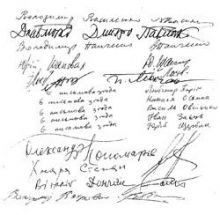Since the proclamation of independence in 1991 the threat of dilution or even loss of Ukraine’s statehood has never been as obvious as it is now. Our alarm is caused, in particular, by the social policy of the current government, and such odious persons as vice Prime Minister Volodymyr Semynozhenko and the minister of education and science Dmytro Tabachnyk who have become its leaders.
Using their posts, they cynically try to impose on Ukraine their own political views, which are grounded on dated myths of Russian and Soviet historiography. These are conceptions, chauvinistic in their essence, which humiliate the Ukrainian nation, deny Ukrainian identity and question the ability of Ukraine to be an independent state. By this they exclude our country from the system of European values, poison the conscience of Ukrainian citizens, and create divisions in society and the country.
Speculating on political errors of the previous government, and at the same time ignoring the achievements since independence, they try to bring us back to the totalitarian past. The embodiment of this is Dmytro Tabachnyk’s frontal attack on the Ukrainian language. He signed a number of resolutions, notably canceling state examinations in Ukrainian for bachelors and eliminating mandatory external independent testing in Ukrainian. This has allowed all the universities in Ukraine to “enroll and teach foreigners in the language of the foreigners’ choice and in which the higher educational establishment is willing to teach them.” It’s not difficult to see that they reproduce the language policy carried out in Ukraine during the communist period, resulting in a de facto de-Ukrainization of the entire educational system, and Ukraine itself. At the same time the new terms of the external testing bring back old corruption schemes, depriving many citizens of an opportunity to obtain higher education.
Equally dangerous are the intentions of representatives of the current government to pass over to regional administrations important powers on the issues of education, culture, determining the status of languages, and forming historical memory. Implementing such measures will inevitably lead to a cultural dissection of the country into regional segments, thus posing a real threat of the disintegration of Ukraine as an independent state.
In view of these dangers we consider it is necessary to state:
1. Social policy under the execution of Volodymyr Semynozhenko and Dmytro Tabachnyk has a provocative and destructive character. It intends to restore stereotypes of the imperial totalitarian past; it deprives Ukraine of its own history, divides society and undermines the foundations of Ukrainian statehood.
2. The Russification of Ukraine, which they try to justify by false statements about the protection of the rights of Russian-speaking citizens or illegal reference to the European Charter for Regional and Minority Languages, is a way of destroying the Ukrainian nation as a key system-forming factor of Ukrainian statehood. The constitutional definition of the Ukrainian language as the only state language corresponds to the practice of European states, where the state status of the national language is a powerful tool of developing civic nations, the consolidation of society, strengthening the unity of the country, and counteraction to leveling its national and cultural uniqueness.
3. The state status of the Ukrainian language doesn’t endanger the linguistic rights of non-Ukrainian speaking citizens of Ukraine who have a possibility to freely speak their native tongue, or other language, and use any language in cultural and public life. The guarantee of language harmony in Ukraine lies in the citizens’ respect for the state language and their knowledge of it, despite speaking other languages fluently. Disrespect for the state language and ignoring its status artificially and purposefully leaves the Russian-speaking part of our society isolated from the Ukrainian language, history and culture. The language policy should promote understanding in society, not create alien and hostile enclaves in some of Ukraine’s regions.
4. The stateless-colonial status of Ukraine during several centuries resulted in a situation where many of Ukraine’s regions ukrainian is a minority language. Today, in independent Ukraine, it is the language rights of Ukrainians and not Russians that are systematically and extensively violated. Ukraine is threatened not by Ukrainization, but by establishing a solely Russian-centered linguistic and cultural reality. Because of the devastating results of Russification, the language policy of the Russian Empire and that of the communist regime, and also due to the absence of a clear and consistent language policy in independent Ukraine, today it is precisely the Ukrainian language that needs strong state support. Thus, the European Charter for Regional and Minority Languages should be used by the government not against, but for the protection of the Ukrainian language, as well as other languages of similar status.
We are again facing the threat of destroying Ukrainian Ukraine, and the loss of independence. We ask all interested, thinking citizens, teachers, professors, students, and parents whose children study at schools and in higher educational establishments, to join this appeal and demand from the government:
- to remove Volodymyr Semynozhenko and Dmytro Tabachnyk from their posts;
- to reject the anti-Ukrainian social policy which splits our country, endangers its existence as an independent state, and eliminates it from the European civilization sphere.
We appeal to create a Resistance Movement against Russification, corruption and destroying the Ukrainian identity.
City of Kyiv. May 6, 2010
Signed by: Volodymyr Vasylenko, Volodymyr Viatrovych, Bohdan Horyn, Vitalii Donchyk, Ivan Zaiets, Volodymyr Kryzhanivsky, Roman Krutsyk, Ihor Losiev, Levko Lukianenko, Pavlo Movchan, Vasyl Ovsienko, Natalia Osmak, Dmytro Pavlychko, Volodymyr Panchenko, Liubomyr Pyrih, Oleksandr Ponomariv, Mykhailo Ratushny, Mykhailo Slaboshpytsky, Yulia Tymoshenko, Stepan Khmara, Volodymyr Tsybulko, Oleh Chornohuz, Yurii Shapoval, Yurii Shcherbak







